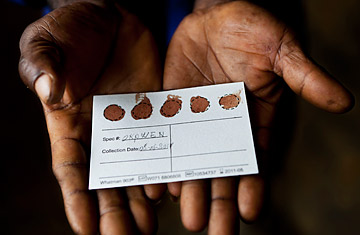
Hunters collect blood from animals they've killed and turn it in for research.
(4 of 6)
That's what happened. Screening those blood samples, Wolfe and his colleagues soon discovered new variants of a virus called HTLV. Millions of people around the world are infected with the HTLV-1 strain, which can sometimes lead to adult T-cell leukemia, or HTLV-2, which may cause neurological diseases. But the hunters' blood contained two variants the researchers called HTLV-3 and HTLV-4. Though it's not clear yet whether the new HTLV variants cause disease, they're retroviruses like HIV--and they've been spreading silently among humans. "If we're going to find the kind of new viruses that might trigger pandemics, we need to do the kind of work Nathan is doing," says Charles Chiu, a microbiologist at the University of California, San Francisco, who collaborates with Wolfe.
There's never been a better time to be a virus hunter like Wolfe, thanks in part to inexpensive genetic sequencing and other techniques that allow scientists to rapidly isolate pathogens. Wolfe is a preternaturally calm guy--you have to be if you're going to work in the field, where the occasional flooded bridge keeps you from your appointed rounds--but get him talking about the microscopic world and he lights up. "We're just at the dawn of a new age of microbial discovery," he says. "You could spend your career as a scientist trying to find one new primate, but we find new viruses every year."
But pandemic prevention isn't just about cataloging new pathogens; it's also about trying to contain them. And that goes back to the bush-meat hunters, the people coming into direct contact with wild animals and their blood. Stop the bush-meat hunt and you might rob viruses of the chance to leap the species barrier. You'd also benefit conservation. One of the leading threats to endangered animals, especially primates in Central Africa, is the bush-meat trade.
It's not so simple just to shut the ad hoc business down, though. Villagers in Cameroon and elsewhere in Central Africa aren't scouring the forest for prey because they want to, as anyone who's shadowed a hunter on an hours-long trek knows. Bush meat is virtually the only source of protein available in the countryside, and as African cities have swelled, there's additional demand at the market from urbanites who crave a taste of dik-dik or monkey. (It's common to see Cameroonians selling freshly killed bush meat along the roadsides.) "If we could snap our fingers and eliminate all contact with wild game, that would be great, but it's an impossibility," says Wolfe. "This is an issue of rural poverty." That puts Wolfe and his colleagues in a tough spot. They know that bush-meat hunting is a danger to the entire planet. But desperately poor people need to eat.
Preventing pandemics, then, also means addressing basic issues of development. That's a tall order, and Wolfe would like to see more aid focused on alternative sources of protein, like domestic animals, rarely seen in rural Cameroon. In the meantime, GVF promotes what you might call safe hunting.
